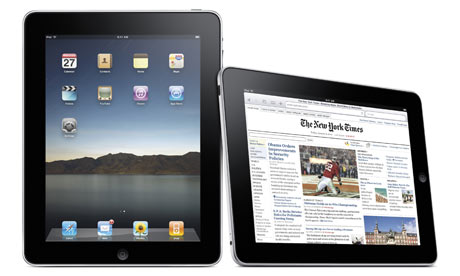Fear Not the iPad: Why Hating Apple's Tablet is Just Plain Backwards
There are an awful lot of iPad naysayers, and they're a backwards bunch.
 The flurry of adjectives is enough to recall Y2K-level hyperbole: various outlets (including Bnet.com) have thrown around terms like "foolish," "closed," and even "dangerous."
The flurry of adjectives is enough to recall Y2K-level hyperbole: various outlets (including Bnet.com) have thrown around terms like "foolish," "closed," and even "dangerous."
Popular Science pretty much crystalizes the ad hominem silliness: "Once we replace the personal computer with a closed-platform device such as the iPad," Tim Conlon writes, "we replace freedom, choice and the free market with oppression, censorship and monopoly."
Here's why that -- and the rest of the oddly enthusiastic doomsayers -- are just wrong.
Complaint: Apple is a Stalinist, Evil Santa Claus Critics have said that Apple [AAPL] exerts too much control over the iPad/iPhone platforms, with its ability to veto apps from the App Store, limit user access to the iPad (and iPhone's) guts, and punish "bad" users by disabling things. They say it only allows you to do "what Apple allows." In other words, it's bad for tinkerers.**
 But anyone who has spent a life disassembling things knows that you start with simple, ubiquitous objects. The AM/FM radio. The Honda Civic. The generic Windows PC. To tinker, you need to wonder how something works, and how it could work better. If you don't see that gizmo around a lot, you won't start to wonder.
But anyone who has spent a life disassembling things knows that you start with simple, ubiquitous objects. The AM/FM radio. The Honda Civic. The generic Windows PC. To tinker, you need to wonder how something works, and how it could work better. If you don't see that gizmo around a lot, you won't start to wonder.
Lots of companies have wasted millions producing devices for tinkerers, also known as "computer nerds." OQO, Samsung, Nokia [NOK] and Asus have been making wonderfully hackable gizmos for years, like the Q tablet pictured below. They don't "catch on" because they do too much and they intimidate normal people.
Riccardo Mori captures the synchrony between simplicity and hackability aptly on his blog: "To me, simplicity in an object, in any device, has always been an essential feature driving my curiosity, capturing my attention and interest in the object or device; wanting to know more," he says. "When that spark is ignited, nothing can stop a true tinkerer."

Complaint: No Flash?! ZOMG! Apple blocks some stuff. One example is Flash, the Adobe [ADBE] software that is used in most Web videos and many advertisements and games. But complaining about Apple's "no Flash" policy ignores the fact that Flash is also a "closed" product developed by another corporation, Adobe, and it will quickly be outpaced by open standards like HTML5, Javascript and CSS, technologies that can do Web video and gaming without any of Flash's tyranny or trademark suck. Apple also ditched the floppy drive. Do you miss it?
 Apple can also block apps from its App Store if it doesn't like them. Sometimes it's judicious -- witness the removal of the "baby-shaker" app -- and other times it's anti-competitive, as with its nixing of the Google [GOOG] Voice app. (For the record, the Voice debacle pissed me off more than most.)
Apple can also block apps from its App Store if it doesn't like them. Sometimes it's judicious -- witness the removal of the "baby-shaker" app -- and other times it's anti-competitive, as with its nixing of the Google [GOOG] Voice app. (For the record, the Voice debacle pissed me off more than most.)
But Apple isn't providing a public service with the App Store; of course it's going to control things. The iPad and iPhone generate revenue largely from the App Store, so you can think of Apple more as the owner of a strip mall than as a "platform maker." If they want to kick out the head shop that's selling dubious stuff, that's their right. They're trying to control the feel of the place.
Of course, that rejected head shop doesn't go out of business; it just moves outside the mall. Google did this with its Google Voice Web app, which you can access via Safari and is nothing short of stellar, and soon other future-forward Web apps will be doing all the stuff that native apps can do -- including tough tasks like geolocation and video. Web app growth is expected to dwarf native app growth in the next few years according to some studies. The "gatekeeper" argument is moot, and is only getting... moot-er.
Even if you don't believe that, consider that OEMs will always control as much as they can without running off buyers. It's the equilibrium of things. Microsoft [MSFT] tried to get away with foisting Internet Explorer upon us all. How well did that work out?
We wouldn't tolerate this on Windows or Mac OS X, but that's irrelevant. We don't need the iPad to be completely free; real freedom is what the PC is for. At least, for now. Influential programmers like Steven Frank think that it's ultimately going to be a mobile world, and that things like the iPad are just pit-stops on the way to a future in which your tablet computer is your only computer. "Apple is calling the iPad a 'third category' between phones and laptops," he says. "I am increasingly convinced that this is just to make it palatable to you while everything shifts to New World ideology over the next 10-20 years."
 But if you're afraid this new, restricted OS will become the norm, talk to anyone who suffered through the gas shortage in the 1970s. They'll remind you that consumers do not take kindly to "Indian giving." You can't give them cars, then take away gas and expect them to be happy. Tablets will have to meet or exceed PC-level "freedom" or people are not going to buy them.
But if you're afraid this new, restricted OS will become the norm, talk to anyone who suffered through the gas shortage in the 1970s. They'll remind you that consumers do not take kindly to "Indian giving." You can't give them cars, then take away gas and expect them to be happy. Tablets will have to meet or exceed PC-level "freedom" or people are not going to buy them.
Complaint: We Don't Need This Befuddled outlets like PCMag have called the iPad "good for nothing." Then again, we don't need a lot of things that sell well: witness the Snuggie. But people like what people like. And people love their Web and their media. A lot. And they like getting to this stuff via a whole host of variegated conduits: phones, computers, and everything in between. The tablet form-factor lends itself well to certain stuff: reading books and online magazines, for one; movie-watching, for another. If you don't do that stuff a lot, you don't need an iPad. You probably also still use AltaVista.
Steve Jobs himself could have been considered in this camp as recently as September of 2009, when he said: "I'm sure there will always be dedicated devices, and they may have a few advantages in doing just one thing," he said. "But I think the general-purpose devices will win the day."
At first, the iPad looks like a "dedicated device," but Steve has not contradicted himself. The iPod and the iPhone also seemed like one-trick ponies at first. Then suddenly they started doing books (via Kindle), games, productivity apps, and movies. This is Apple's salesmanship again: they sell specific, but build general.
This is always how computers go. The first ones were sold as big calculators: the original Mac hit the big time because of a great spreadsheet app; suddenly everyone understood why they needed a GUI computer. As John Gruber at Daring Fireball summarizes Apple's bait-and-switch marketing thusly: "The iPhone... was conceived and has flourished as a general-purpose handheld computing platform. It was not introduced as such publicly, and is not pitched as such in Apple's marketing, but clearly that's what it is."
Scared and hard-wired is no way to go through life. Remember when we were all freaked out about using our credit cards online? This iPad hysteria too shall pass.
**Update: I'd like to clarify the "tinkering" argument like so: if you're upset about Apple's restrictions, then you'd do well to try to break these restrictions, because you'll find out quickly that most are very, very simple precautions. Apple disables you from accessing the file system of the iPhone at your leisure (for example) because you can really screw things up that way. Sandboxing apps allows you to experiment more: you can write software that, however daring, doesn't interfere with the OS or other apps. And if you're looking to do something Apple doesn't like, jailbreaking takes a couple of minutes. It's literally no harder than entering the CLI on your PC, and definitely easier than rooting a server. The restrictions aren't meant to block programmers; they're meant to protect users from themselves. As any programmer can tell you, that's one of engineering's primary (if unglamorous) tasks. If you want to experiment without reigns, use a computer. You don't try to cook on your dinner plates, do you? Of course not. They're for serving and consuming. Whether or not "consumption" devices are a good thing for society is an argument outside the scope of this post. ***Update (2): Read my colleague Erik Sherman's rebuttal to this post here.